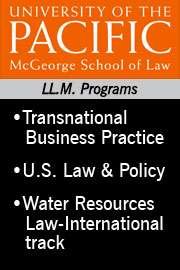LL.M. programs for international students
What to consider in your selection
Whether you’re an international student who wants to practice in the United States or a practicing foreign lawyer looking to study American law, an American LL.M Stands for Master of Laws program might be a good vehicle for you.
A: Determine your motivation and reasons behind getting your LL.M. Look for diverse programs. This will give more opportunities for networking and studying with experienced professionals. Alumni are an important factor as well. See who else attended that program and what they are doing now.
Make sure you leave the program with a thorough understanding of basic American common law that you will use whether you intend to practice in the United States or take your knowledge back home with you.
Many LL.M Stands for Master of Laws programs will allow a lawyer to specialize in a particular area. Search for the school that has a program to fit your interest.
The ability to specialize in a particular area is a benefit, but the real payoff of an LL.M. should be to enhance the totality of a career, through contacts, professional development, and the program you select. An LL.M is not for everyone. For the right person, however, it’s a chance to enhance areas of your legal practice.
Gaining some experience first may be to your benefit, allowing you time to discover what you really want to do. If you have the available time; it can serve as a good career enhancement.
- Articles
- Law Schools
- LSAT
Graduation requirements for an LL.M Stands for Master of Laws program vary depending on the each university and their guidelines. Programs can be online as well. See our online page at https://legalenglish.com/llm/online.php
Visit the LL.M News Blog
https://legalease-international.blogspot.com
LL.M programs can also be joint programs with other degrees.
LL.M Stands for Master of Laws. LL.M is an abbreviation of the Latin Legum Magister, which means Master of Laws. The plural form of a word in Latin is abbreviated by repeating the letter “L”, therefore “LL.” is short for “laws.” Legum is the possessive plural form of the latin word lex, which means “specific laws”, as opposed to the more general concept embodied in the word jus, from which the word juris and the modern English word justice” are derived. As such, the designation of an LL.M. degree is usually accompanied by the particular field of law in whch the degree was obtained, e.g. LL.M. in Taxation.
The LL.M Stands for Master of Laws degree is a postgraduate law, usually obtained by completing a one-year full-time program. The LL.M. is a higher academic degree than the J.D. degree. Students and professionals frequently pursue the LL.M. to gain expertise in a specialized field of law, for example in the area of tax law or international law. It indicates that a lawyer has acquired advanced, specialized legal training, and is qualified to work in a multinational legal environment. Lawyers are not required to hold an LL.M. degree, and many do not choose to obtain one. An LL.M Stands for Master of Laws degree by itself generally does not qualify graduates to practice law; in most cases, LL.M. students must first obtain a professional degree in law, e.g the Juris Doctor (J.D.) in the United States, and pass a bar exam before they can practice law.

